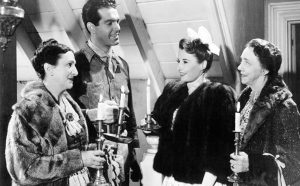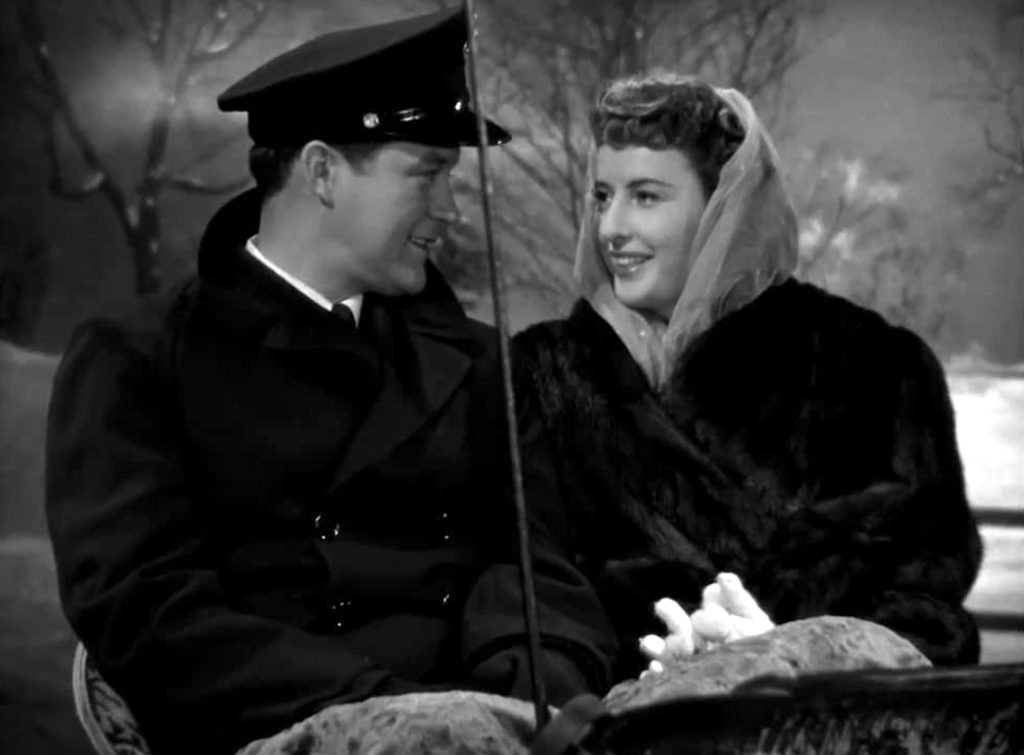Christmas as we know it has always been about performance. As children we are raised as shepherds with pillowcases draped over our heads. Outside the pageant we soon learn to fake enthusiasm when we open the gift box to find that, through some clerical error, Santa has given us clothes. As we mature we become Santa ourselves, chomping cookies in half to mimic his haste.
We string lights outside the house, a performance of Christmas cheer that loses significance once the extended family goes home. When it comes to caroling, we basically hunt down our neighbors to inflict holiday cheer against their will. The yuletide demands an audience; if a Christmas tree falls in the woods and there’s no one around, does it make a sound?
Two black-and-white films that challenge the Christmas of mere appearances are “Christmas in Connecticut” (1945) and “Remember the Night” (1940), each coincidentally showcasing my favorite movie star, Catholic convert Barbara Stanwyck.
Stanwyck was a dual threat of comedienne and dramatic actress, a searing firecracker of a woman against whom I measure all past and prospective romantic partners. I guess you could say I admire her work. This piece, like most of my life, is a machination arranged just to talk about her.
“Christmas in Connecticut” finds her in farcical territory, playing Elizabeth, a magazine writer beloved by housewives across the country for her homemaking and cooking tips. Her lone male fan is a convalescing veteran (Dennis Morgan) who requests, and is thus granted by her editor, a Christmas feast at her quaint country home.
The only hitch is that she has no such home, or indeed any ability to cook. Such was the Wild West before LinkedIn, where a firm handshake was the only reference you needed. In classic farce fashion there are complex webs of white lies and noms de plume, thwarted engagements and busted soufflés, stolen sleigh rides and pilfered infants. Basic stuff, really.
The beats are familiar to anyone with a cursory knowledge with the act structure of “Frasier,” but the film hits at something far deeper than the usual hijinks. Although Elizabeth lies to her readers, it’s merely a donation to the common lie we all maintain. The trappings of American Christmas were largely born in the wake of the Great Depression and two world wars. Think on “White Christmas,” which is a nostalgic song about nostalgia itself.
On some level, the viewer knows that Elizabeth and her pastoral picaresque are fiction. The difference is we aren’t nearly as surprised as Elizabeth is to find accomplices to her charade.
If “Christmas in Connecticut” is about the power of Christmas illusions, “Remember the Night” is a necessary corrective on their dangers. The latter stars Stanwyck as Lee, a shoplifter arrested just before Christmas. Sensing the jury is filled with festive pity, the district attorney Jack (Fred MacMurray, in an early pairing with Stanwyck before “Double Indemnity”) decides to postpone the trial until after Christmas. Feeling a tad guilty for his trick, especially upon learning they’re both from rural Indiana, Jack offers to drive her back home to visit her estranged family on his own way back home.

The setup feels familiar, as if the film anticipated the hegemony of Hallmark movies over the American psyche. But more impressive is how it deflates those same expectations as soon as they approach. Lee’s family reunion seems destined for mawkish tears and group hugs, but the movie doesn’t hedge from brutal truths: Families don’t estrange themselves for no reason, and too often when we lay ourselves at another’s feet, they prove too small to lift us back up.
Mortified at his failure, both Jack and the film pivot to his boyhood farm, where his family proves far kinder to Lee than her own.
Both Lee and the audience finally feel at ease. This is how Christmas should go. The farm is a bucolic paradise, the fake Connecticut country home made reality. Corn is popped, carols are sung, the yuletide generally made gay. (Jack’s sweet hearted mother is actually played by George Bailey’s mom from “It’s a Wonderful Life.”) We see Lee blossom as their unconditional love gives her the space to relish her existence, instead of continually justifying it.
When a different sort of love starts to grow between Jack and Lee, we again feel the inevitable tug of festivity. We know this path, and it ends with mistletoe. But “Remember the Night” remains special because it too feels this tug and yanks back. As Jack’s mom sees the lingering looks between the pair, she begins to fret at the thought of her son hitching his wagon to a felon.
Despite her brief sojourn as part of the family, Lee is firmly reminded that she is but a guest. We understand that Lee is life’s eternal visitor, welcome so long as she doesn’t settle.
If Lee is to be saved, it isn’t in the trappings of Christmas. These are mere signifiers of the season. Christmas came to Connecticut not in the promised feast, but in the conspiracy of friends that made it happen. And Christmas wasn’t found in small-town Indiana, arranged like the interior of a snow globe. It comes later in a frigid New York courtroom, where Jack and Lee each try to sacrifice their future so the other doesn’t have to.
It’s no sin to be cozy, but to quote singer Jason Isbell, “You thought God was an architect, now you know/ he’s something like a pipe bomb ready to blow.” Jesus is the prince of peace, but sometimes it’s far easier to see him in the chaos.

